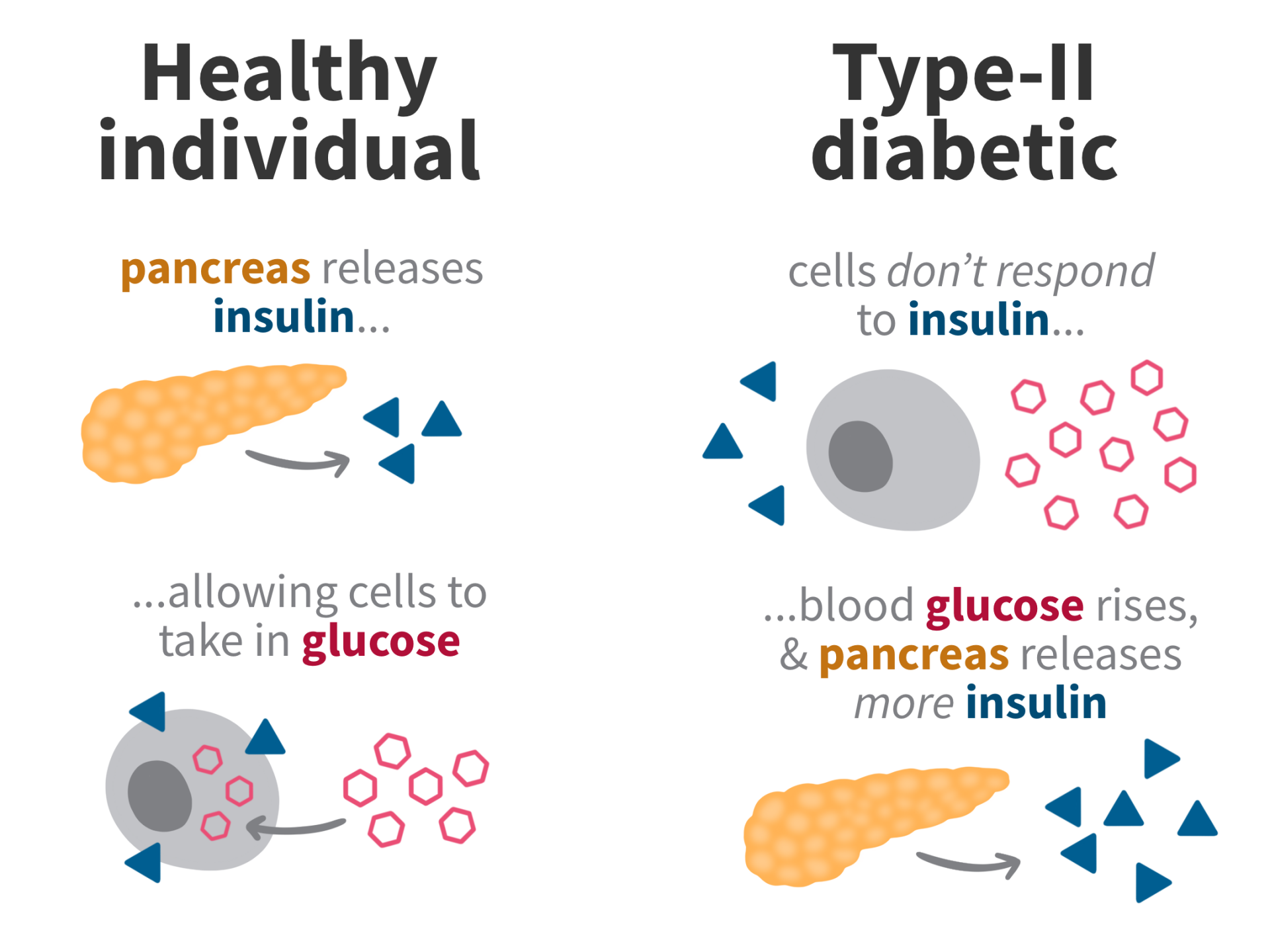Diabetes is a medical condition that prevents the body from processing and using blood sugar. It’s associated with excess weight and afflicts many people with obesity. The good news is, weight loss is often the solution to improve. A moderate amount of weight loss can help reduce diabetes medications and even put the disease into remission.
Causes of Diabetes
When we eat foods with carbohydrates, our bodies break them down into glucose (sugar). It travels through the bloodstream supplying energy to our cells. But before our cells can use glucose as energy, they need a hormone called insulin. The pancreas detects the presence of glucose in our blood after we eat and releases insulin to balance (lower) our blood sugar levels.
Medical obesity specialist, Dr. Craig Primack MD says, “Insulin takes the blood sugar that’s floating around in our bloodstream and puts it into the places we need it”. According to Dr. Primack, insulin is like “the key in the lock,” opening the door for our muscles, organs, and fat to take in the glucose and put it to use.
When insulin is no longer able to fulfill this crucial role, we can gradually develop type 2 diabetes. It’s not entirely clear why insulin stops functioning, but it’s agreed that obesity and physical inactivity are contributors.
Risk factors for diabetes include:
- Obesity: When our bodies have more fatty tissue, especially in the abdomen, our cells become more resistant to insulin and need more to reduce blood sugar levels.
- Inactivity: Physical activity uses up glucose for energy, which lowers blood sugar levels. It also helps with weight control and makes cells more sensitive to the effects of insulin.
- Age: Anyone can develop diabetes, but those over 45 are at higher risk.
- Family History: If a parent or sibling has type 2 diabetes, you will be at higher risk.
- Race: You’re at higher risk if you’re black, Hispanic, American Indian, Asian American or Pacific Islander.
Stages of Diabetes Development
It takes time for insulin to stop functioning properly. The path to type 2 diabetes is broken down into three stages:
- Insulin Resistance. The body’s cells stop responding to insulin’s effects. The pancreas compensates by pumping out more insulin to keep blood sugar levels normal.
- Prediabetes. As insulin becomes ineffective, the pancreas continues to release more insulin to reduce glucose levels. As insulin levels continue to rise, the body becomes more resistant to its effects. The pancreas can no longer keep up and sugar levels rise.
- Type 2 Diabetes. With the pancreas no longer able to balance glucose, blood glucose levels remain high and continue to rise.
The time it takes to progress through these stages varies. But without treatment or lifestyle change, prediabetes results in type 2 diabetes within 10 years

Diabetes Symptoms and Complications
While glucose is important for our bodies, high levels result in poor health and medical consequences.
Insulin resistance and prediabetes cause no symptoms but may lead to increased hunger 30 to 90 minutes after a meal. People often suffer from diabetes for years without realizing it.
Symptoms of diabetes can include:
- Blurred vision
- Slow-healing wounds
- Fatigue and irritability
- Unexpected weight loss
- Frequent or recurrent infections
- Increased thirst and more frequent urination
- Increased hunger and hunger soon after eating
- Patches of dark skin, especially in the armpits or neck
As glucose levels climb higher, they can cause serious nerve and blood vessel damage. This puts those who suffer from type 2 diabetes at an increased risk of complications like:
- Stroke
- Blindness
- Heart disease
- Kidney failure
- Lower limb amputation
Testing and Treatment for Diabetes
Blood sugar tests are used to assess glucose levels and determine if you are at risk or have diabetes.
Medications are used to control type 2 diabetes. But they must be taken indefinitely and aren’t a long-term solution. According to medical obesity specialist, Dr. Robert Ziltzer, some medications can lead to weight gain. Instead, he suggests weight loss as the best form of treatment.
“If you continue gaining weight, you’re less likely to ever be cured of diabetes,” Dr. Ziltzer says. “Losing weight will improve the body’s sensitivity to insulin, and as a result that insulin will work better.”
This is How You Lose the Weight, Once and For All
If you’re ready to say goodbye to quick fixes that never last? And you’re serious about losing the weight for good? We’re the experts you can trust to guide you through a weight loss program that will not only take the weight off but keep it off.
Schedule a consultation with us today.

